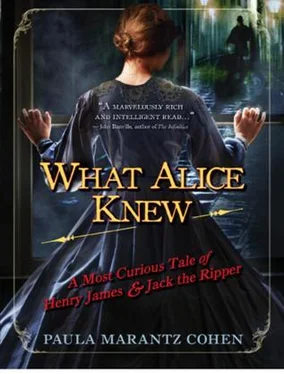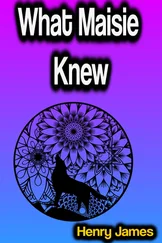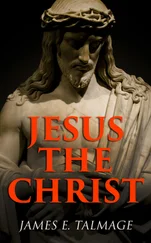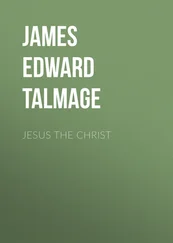“Oh no!” groaned Alice.
“Henry Sidgwick is a noted philosopher and classical scholar. A giant in his field.”
“Also a spiritualist crank.”
“Alice!”
“I can’t help it. The man is president of the Society for Psychical Research—I believe that is the title chosen to dignify an interest in Ouija boards and crystal balls. For someone of your intellect and reputation to be drawn to that sort of thing is an embarrassment. I know that you mourn your Hermie; the loss of a child is more painful than any wound a human creature can suffer. But grief is no excuse for idiocy.”
“I will not listen to you speak this way.”
“All right. Just leave me the letters and go ask the spiritualists to solve the case.”
“I am not asking the spiritualists to solve the case. I’m just leaving the window open.”
“I never leave my windows open; surest way to catch a head cold,” commented Henry, but neither his brother nor sister were in the mood for his whimsy.
Alice glared at William. “Leave your window open, but close mine—bolt it, please,” she said sharply. “I don’t want some sniveling ghost rapping on my walls and chattering about how Father buttoned his jacket or Mother held her knife. If you want to talk that sort of palaver with a Cambridge don, you have my blessing. But I want the letters.”
William looked at his sister, took the envelope out of his pocket, and handed it over. “Keep them tonight. But be careful with them.”
“I’ll be sure to wash my hands.” Alice sat back on her pillows, looking pleased. “So now that that’s settled, what do you say to a cup of Moroccan coffee? Violet Paget brought the beans back from her last trip to the Orient. We could throw in a little eye of newt.”
William scowled and got up from his chair. “I’m afraid I have to skip the coffee. I promised Sidgwick I’d meet him at the Oxford and Cambridge Club.”
“I have tea if you prefer,” said Alice. “I’m told the leaves are very informative.”
William, sensing that mockery of an escalating sort was in the air, grabbed his hat and strode to the door.
“But if I can’t tempt you, then at least we can plan our next rendezvous.” She lowered her voice dramatically. “‘When shall we three meet again?’”
Henry took it up, laughing. “‘In thunder, lightning, or in rain?’”
“Oh shut up, both of you!” said William, slamming the door behind him.
William left Alice’s flat and began to walk toward the site of his rendezvous with Henry Sidgwick. The prospect of meeting Sidgwick, with whom he had corresponded but never met, excited him. Both men were eminent in their fields of philosophy and shared, along with their respect for rational mind, a sense of great, uncharted vistas beyond the scope of the rational. People like his sister had no appreciation for this sort of thinking; they were grounded in practical reality. But William knew that the vast majority of human souls hungered for a belief in the unseen but feared how such belief might be perceived. Henry Sidgwick had the courage to look foolish.
William was entertaining these thoughts as he walked up Piccadilly toward Regent Street, where he intended to cross and make his way to Pall Mall. It was early evening, and large numbers of the workforce had left their place of employment. There were robed barristers and suited scriveners, men in shirtsleeves who had come out of the pubs, and ascotted gentlemen on their way to their clubs for drinks. There were elegant ladies who had just finished tea in Mayfair and governesses pushing their prams. The weather, as was usual for London, was overcast, and a light rain fell, enough to produce the bedraggled look that was characteristic of the English crowd. Some had their umbrellas up, though the rain was light enough that many simply walked quickly, collars up, hats pulled down.
The crush of humanity felt novel to William. Boston was a large city but not a hectic one, and even there, he confined himself to the more rarified enclave of Cambridge, and within that, of Harvard College. This was where he lived with his family, where he carried on his work, taught, and entertained visitors. This was where he had established a fortress to protect his intellectual and personal aspirations. It was a site at once circumscribed and supremely free.
Thrown into the hubbub of the London streets after a workday, he was struck by the reality of teeming human life that his daily existence tended to obscure. The difference, he also realized, was the difference between the New World and the Old. In one, the sense of the individual was paramount. “We are all endowed by our creator with certain inalienable rights,” he quoted to himself proudly. In the other, the individual was submerged, not just in the density of population but the sheer weight of history. As an American, he had shed his old-world heritage as though he had nothing behind him beyond a vague loyalty to Ireland. He could stretch his arms and legs and do whatever he pleased. But here, the past was always present, pushing up against you in coats of arms and family estates, in portraits and heirlooms, and in the web of relations, near and far. Even among working people, the past hung heavy. They were pressed into age-old traditions and customs, following along, doing what was expected, doing what was always done. The idea of following the past because it was the past repulsed him, though he also knew that history was the resource, the supple clay, that he relied on for his intellectual life and that he needed to produce his work.
He felt this duality now as he made his way through Piccadilly. London was truly the center of the Old World, in which the weight of the past and the richness of the past combined, where diabolical minds could operate unseen, and where the greatest, most penetrating intellects could be found and unite in brotherhood. It was exciting, this Manichaean city, this conjunction of evil and good, animal stupidity and godlike intellect. Yet he was glad, as he glanced around him at the scuttling populace, that he did not have to live here for any length of time.
He arrived at the crossing at Piccadilly Circus with its circle of racing vehicles and lurching crowds. A policeman was directing the traffic, flicking a gloved palm to direct the throng to cross the thoroughfare and then holding it up stiffly to indicate that they should wait. The carriages were clattering past, including a large curricle with four horses, which the driver was whipping faster, so as to make the corner before the need to stop.
William was standing with the crowd at the curb, waiting for the signal to cross, when suddenly he felt a quick but powerful shove to the center of his back that propelled him into the street. The jolt to his body was so sudden and so unexpected that he barely had time to realize what had happened. At one moment he was standing idly on the corner; at the next, he was lying in the dirt with the curricle about to bear down upon him. There was an enormous din, a chaotic clatter of wheels, and a piercing braying of horses as the carriage, its spokes stirring dust up into his nose and mouth, swerved to avoid hitting him. He could hear cursing as the driver, who had been in such a hurry, careened to the side of the road. William, meanwhile, lay dazed, his face pressed into the mud and gravel, until he was pulled to the side and helped to his feet. His suit and face were covered with dirt.
The officer directing the traffic had run up. “Are you daft!” the officer shouted, pushing him angrily onto the curb. Then, seeing that he was a gentleman and an American, took a more conciliatory tone. “You Americans got to watch yourselves,” he said, making a show to dust off William’s jacket. “We lose more of you that way than even we would like. Keep back from the street and look both ways, I tell your people, if you don’t want to be sent home in a box.”
Читать дальше












